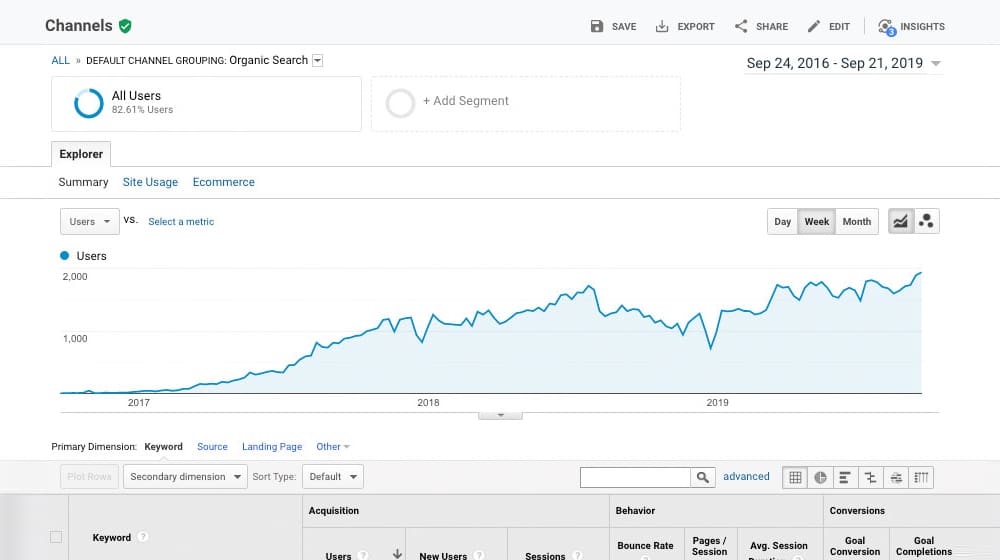What Are the Job Duties of a Chief Content Officer?

Sometimes it seems like there are so many C-level executives in a given business that half the workforce is made of them. Sure, there are cynical reasons for this that I won't get into, but that's not what I'm here to talk about today.
One of the reasons for this is that companies increasingly recognize the importance of certain silos of the business process. In the past, you had the core C-suite. People like:
- The CEO is the one who runs the company.
- The COO, the chief operating officer, runs daily operations (where the CEO runs overall business strategy.)
- The CFO, the financial officer responsible for the money, allows the other two to do what they do.
Then you have other C-levels who are not guaranteed to be present in all of them while relevant to many businesses.
- The CCO, the chief compliance officer, is the one who operates in regulated industries to ensure that the company complies with laws and regulations.
- The CHRO, the chief human resources officer, is the one who guides the overall HR department and makes hiring strategic choices and decisions.
- The CMO, the chief marketing officer, is the one who guides overall strategic planning, marketing, and messaging.
On top of that, there are more "modern" C-levels. These roles represent sensibilities and the increasing importance of specific positions, initiatives, or processes that companies might not have acknowledged years or decades ago.
- CDO, the chief diversity officer, is responsible for diversity and inclusion initiatives. Sometimes this is a spin-off of HR.
- CTO, the chief technical officer, is responsible for the technology and cutting-edge upgrades a company needs to compete.
- CCO, the chief content officer (yes, there are multiple CCOs).
What does the Chief Content Officer do? Do you need one for your business?
What Does the Chief Content Officer Do?
The CCO in a business is generally the head of content creation. They probably don't create assets or media themselves, though they may have in the past, or they might make mock-ups for their overarching ideas.
You can think of the CCO as the captain for all things related to your company's content.

According to CMI (Content Marketing Institute):
"The Chief Content Officer (CCO) oversees all marketing content initiatives, both internal and external, across multiple platforms and formats to drive sales, engagement, retention, leads and positive customer behavior. This individual is an expert in all things related to content and channel optimization, brand consistency, segmentation and localization, analytics and meaningful measurement."
They are responsible for:
- Creating the overall branding for the company, with everything from your voice and style to your color choice.
- Creating an overarching brand "story." A brand story helps you provide a narrative to back your marketing efforts.
- Builds a consistent content voice, tone, and framework, to maintain a strong presence throughout varying markets and channels.
- Oversees digital content initiatives, including deciding what content marketing channels to invest in and how to use them.
If all of this sounds like marketing and you already have a Chief Marketing Officer, you might wonder why you would ever need a Chief Content Officer. They're pretty similar, after all. Right?
It's a split and siloing of duties and efforts.
Your Chief Marketing Officer and your digital marketing team have a lot on their plate. They're busy producing commercials, creating paid ads, managing ad budgets and ROIs, optimizing targeting, improving brand awareness, and a million other things.
How much effort will your marketing team put into a blog post? Consider that marketing efforts typically have tangible monetary returns, so it's easy to use data analysis to build an ROI and optimize it. With a blog, the ROI is muddied by referrals through multiple channels and indirect returns. It's a lot harder to improve blog ROIs.

When your marketing team can look at an advertising channel and say, "If we spend ten hours optimizing this, we'll make an extra 20% profits this quarter", and they can look at your blog and shrug, which one are they going to invest their time into?
In the past, a chief marketing officer might also handle all of the content marketing. Today, a Chief Content Officer can take over the content marketing side of the coin. The marketing team works on marketing channels, and the content team works on content channels. In a way, it's a split between paid marketing and organic marketing.
In truth, both teams will work very closely together. Assets will need to be shared, and messaging must be consistent; voice and tone must agree. The CCO and CMO will work closely together to ensure everything is smooth. The creatives responsible for producing visual content will often be the same people for both teams.
What Are The Specific Duties of a Chief Content Officer?
As for tangible duties and a simple job description:
1. The Chief Content Officer will oversee the hiring of the content production team. They'll review and analyze blog editors, writers, graphic designers, SEO professionals, and other creative types and formats to be part of the content creation process. They'll often work with the CMO and the CHRO since hiring is a multi-person affair and can affect the whole business.

2. The Chief Content Officer will guide the operations of the content marketing team. While content marketing is marketing, it's primarily content, so it falls under the purview of the content officer. They manage deadlines, populate and regulate the content calendar, ensure a consistent tone, voice, and style across multiple content creators and freelancers, and verify that brand voice and portrayal are consistent no matter the channel.

3. The Chief Content Officer will define, harvest, and analyze KPIs to generate reports on the performance of content marketing efforts. While paid marketing typically has an easy-to-understand set of metrics, content and organic marketing are harder to track and assign value.

Your CCO will need to:
- Define what metrics matter to organic content marketing efforts.
- Establish ways to track those metrics effectively.
- Assign values to the metrics and the returns to ensure accurate tracking and validation.
- Monitor website growth, backlinks, traffic, and other metrics of note.
- Look into demographics and establish content-first customer profiles (different from marketing buyer personas.)
- Understand how content marketing is or isn't targeting customer personas, and adjust efforts to align with business objectives more appropriately.
Throughout all of this, your CCO will be looking for ways to improve any metrics for the company's overall good. Moreover, they will be producing reports that tempers expectations since content marketing is a slow-and-steady, long-term growth channel that cannot have massive, immediate returns.
4. The Chief Content Officer will work closely with other C-levels and teams to ensure continuity across channels. The CCO may guide content marketing, but they're rarely the sole decision-maker. They will need to work with the marketing team to ensure consistent marketing between organic and paid channels. They will need to work with the COO to ensure they're working towards the right goals and objectives in mind. They will need to work with the CHRO to manage your hiring appropriately. The COO role requires partnerships, collaboration, and communication to form an effective and agile team.
Is Chief Content Officer a Real Role?
You might be wondering if CCO is a fundamental role or not. After all, there are tons of agile tech startups out in Silicon Valley who love making up new job titles for everyone on the team, mainly to make their company seem like it's more significant than it is.
No, Todd, your 5-person team where all five of you have C-level roles does not make you a significant player in the tech space.
Ten or fifteen years ago, content marketing was just a subsection of marketing. It was something you did on the side of your paid advertising. Blogging was a thing, but it wasn't essential or even all that popular. Companies that did online marketing focused on paid ads or social media channels.
Then Google's algorithm continued to push for more nuanced, deeper content levels. Things like the Panda algorithm in 2011 changed the face of the internet altogether and made blogging infinitely more critical than before.

After that change, a company couldn't get away with having their marketing team spin up a few blog posts with swapped-out keywords and call it a day. They had to research their topics, create quality content on evergreen subjects, and pay attention to the value real people got out of the blog, not just what Google ranked the posts.
As the attention necessary to run content marketing effectively grew, the teams and the channels and the people involved too. We went from content marketing being a fringe technique to having thousands of companies, small and large, dedicated to it.
According to Russell Reynolds:
"56% of Chief Content Officers have been appointed since 2016.
Companies hired 74% of Chief Content Officers externally.
52% of Chief Content Officers are female."
It's a very fast-growing position, with more and more companies ramping up to hiring one. Moreover, it's excellent to see another high-level role where gender equality is prevalent.
So, yes: the Chief Content Officer job is a fundamental role, not like Todd Sealevel, Chief Snacks Officer, and his cohort of tech buddies.
What Does a Chief Content Officer Job Description Look Like?
Here are some popular requirements for Chief Content Officer roles:

Education Requirements:
- A Bachelor's Degree in English, Journalism, or Public Relations.
- Requires HR experience (oversees hiring, managing, reviews, compensation packages, etc.)
- Over a decade of experience creating content and scaling content marketing efforts
- Expertise with major business software applications (Adobe and Microsoft suite, WordPress, etc.)
Responsibilities:
- Maintain consistency with brand voice, style, quality, tone, and results.
- Planning, creating, and executing sophisticated content strategies to bolster short-term and long-term brand initiatives.
- Develop, maintain, and oversee a content calendar.
- Supervise a team of writers, editors, graphic designers, search engine optimization experts, competitive researchers, and marketers.
- Conduct regular tests and reports to determine content effectiveness, and implement changes and improvements based on those results.
- Establish and perfect a team workflow for planning, writing, editing, optimizing, rewriting, merging, improving, requesting, and scheduling content.
- Conduct in-depth content audits periodically to uncover areas for improvement and then execute a plan to act on those.
- Work alongside the CMO and CDO on creative, marketing, and branding initiatives for a consistent voice.
- Explore and test alternative marketing channels, and compile reports to measure their effectiveness.
Bonuses:
- Multi-lingual
- MBA degree in marketing or sales
- Crisis communications experience
- Audience development and subscription strategies experience
- Programming experience (HTML, CSS, PHP, etc)
- Social media marketing mastery
Does Your Business Need a Chief Content Officer?
Now we come to the real crux of the discussion. Do you need a chief content officer for your company?
The answer may surprise you. It's a solid "maybe."
The truth is, for most smaller businesses and small companies, you don't need a chief content officer. You don't need more than a couple of C-levels, like the CEO, CFO, and CMO. Most of the other C-level duties are just handled by senior managers or directors, at most.
Even then, for small businesses, the titles are mostly meaningless. After all, the CEO of a tiny three-person crafting shack is very different from the Chief Executive Officer of a Fortune 100 company.
A more significant business with a heavy investment in content and messaging can use a chief content officer. Smaller companies generally don't need one.

Hire a Chief Content Officer If:
- You want to define your brand messaging in a way that has never been unified across your business before.
- You want to redefine your brand messaging to adjust for new market pressures in 2022 and beyond.
- You plan to invest heavily in content production and marketing in the coming years but have no one with the overarching skills or experience to guide you through the process.
- You have a great content pipeline, but there's no consistency to it, or there's no one working with metrics to use data to drive decision-making and improve your success rate, and you want that.
Remember, a chief content officer is still a C-level executive at the end of the day. They aren't typically the ones creating high-quality content for you - they're the individual that is responsible for the guidance, direction, and success of your marketing efforts. They manage every part of your content team and ensure that they're performing at the highest level.
They will also demand a C-level salary, scaled to be appropriate for their experience and your business. Many CCOs pull in around $60k to $90k from their starting salary, but that's an average across the whole nation. Again, a CCO based in the mountains will differ from a CCO based in NYC or Silicon Valley. There, the standards are closer to $200k or $300k.
Nothing brings a company to the forefront quite the way a unified brand message and a laser-targeted media blitz can. CCOs can be an excellent investment if you need what a chief content officer does and have the money to hire one. On the other hand, relatively few companies need a chief content officer to handle that. Often, a chief marketing officer and some experienced content analysts and directors can do the job for you just as well. The choice is yours.










March 13, 2022
After reading this, I'm pretty sure we don't need one. Not yet, at least. I think my content analysts and marketing officer are managing
March 15, 2022
Hey Calin!
Thanks for sharing. I agree - this is probably a job title that most companies with fewer than 100 employees probably don't need to consider.